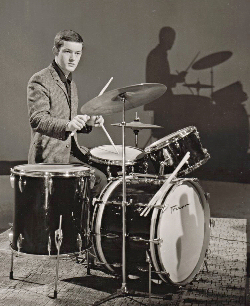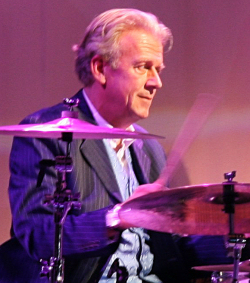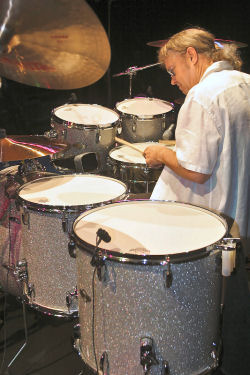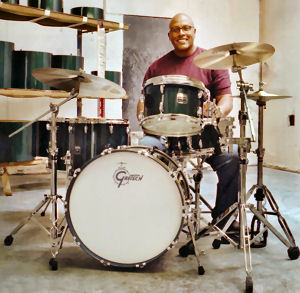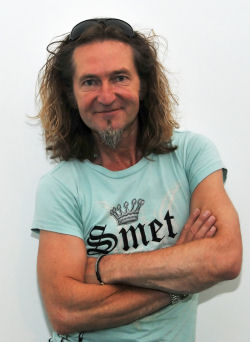
Geoff Dugmore – Photo Dave Hughes
Geoff Dugmore is the most amiable drummer I know, but through no fault of his own, he’s not easy to tie down. The problem is he’s always working with the likes of Robbie Williams, Mark King, Killing Joke, Gabrielle, David Knopfler, Jimmy Nail, Debbie Harry, Brian May, Bob Geldoff, Nick Hayward, Tina Turner, Stevie Nicks, Tony Banks, Tim Finn, Paul Young, Louise, the Thompson Twins, Joan Armatrading, Rod Stewart, Dido, Natalie Imbruglia, Stevie Winwood, the Gypsy Kings, Paul Carrack, Lulu, Busted, Will Young, Johnny Hallyday, Jeff Beck and Ronan Keating. Not to beat about the bush he’s played on 34 number one albums. Mind you that was six weeks ago so it could be at least a couple more by now! And since a lot of his time is spent recording, or touring outside of the UK he must have a great many airmiles to his name. Problem is he won’t ever have time to use them all!
I caught up with him at Drummer Live and grabbed him just after his Saturday seminar on the Mikedolbear.com stage. We got to talking about the playing side of the music industry and how, in reality even though it’s a world-wide phenomenon, it’s not as large as people think it is.
“Well basically everybody knows everybody. It’s a bit of a ‘six degrees’ [of separation] scenario really. There’s a lot of diplomacy required in the music business, I think people maybe underestimate it. You can be sitting at a dinner and maybe say that you’re going to be doing this gig in a couple of weeks but somebody else is perhaps already in that chair. Perhaps he doesn’t realise he’s about to lose that chair. So you’ve got to always have one eye on that”.
I always think it works along the lines of: you throw your stone in the pool and I’ll throw mine, then other people do the same and eventually the ripples will meet – like now.
“I watch [this phenomenon] with great interest – and I say this from past experience – when I was starting off unwittingly in the session scene without realising I was getting involved in that. I always thought the session player was someone who went and did theatre gigs, that was always my interpretation of a session player. I never imagined a session-player as someone who was going to play on people’s albums necessarily. I always thought that was more of a freelance artist [who did that]. I watch with great interest the young kids that are coming through now and I see this kind of incredible competitive thing they have going on with each other. Like someone trying to out-do somebody else, like ‘I’m this busy’, ‘oh, well I’m this busy’ and all this kind of stuff. I watch it with great amusement. I remember when I was starting out and I think perhaps I was probably a bit like that without realising it. But as you develop and become, I suppose, more of a human being you become more confident with yourself and more assured with yourself that you don’t have to lay these rules out.”
It’s when you learn what to leave out which takes years and years, not just in drumming, but in life. I’ve certainly enjoyed life which is why I’m back-pedalling like crazy now.
But it is very interesting to observe the present generation and I think they are more competitive than us. I don’t want to sound old but don’t believe that any of us, when we began, would have thought ‘well if you’ll do it for £10, I’ll do it for £5.’ Or worse still, I’ll do it for nothing, and that is definitely something that prevails now.
“Yes, and I think that is to the complete detriment of the entire musicians industry, because when you get people doing that kind of thing, everybody just expects people to do it for nothing. It also devalues all musicians, it creates a mentality of ‘oh they’re just stupid musicians they’ll do it for nothing’!”
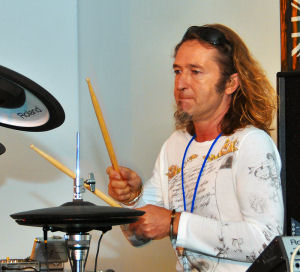
Photo Dave Hughes
Unfortunately, there was a time when we would do it for the fun of playing.
“There probably was, there are certain things you do for nothing but at the same time you have to survive, otherwise you’re stuffed. You get to a certain age and what do you do?”
Well you’re self-employed and unless you happen to be working for the LSO which none of us are, then there isn’t a pension and that’s another story. The business side of it.
“Unfortunately when you’ve got people saying: ‘I’ll do it for nothing, I’ll do it for £10’ it demeans the whole thing. It’s a very strange business entity in that sense. I’m not a bread head, but I believe you should be paid fairly for your abilities.
The other thing is, I think I could negotiate better for you than you can negotiate for you and vice versa, and in my humble opinion I think there’s a need for this to be done – especially amongst drummers. I once looked into setting up what could be called Drummer Management and got to the situation where people wanted me to negotiate for them, but also expected me to pay their mortgage and their bills and I thought hang on, that’s not what I want to do. It was all to do with conversations which began: ‘can you get someone who plays like Steve Gadd’ and I said ‘actually I can get to Steve Gadd, whether or not he’ll do it remains to be seen’.
There’s a Phil Collins story where the producer says: ‘can you play that like Steve Gadd?’ Phil says: ‘hang on a minute’ and gets out his address book and says: ‘I play like I play, but I’ve got Steve Gadd’s phone number here do you want to give him a call?’ You hire the person you want.”
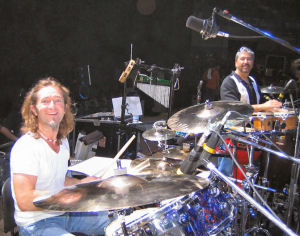
Geoff and Luis Conte
I understand you ran away from home.
“I did, more or less, I was 17. My passion for music started when I was probably 8 or 9 I guess. I would sit with a friend of mine and play board games and listen to ‘Beatles for Sale’ and the Rolling Stones for hours on end and just flip the record back and forward, back and forward and I was supposed to be doing my what you now call GCSE’s (we called them O-levels). I was supposed to be doing an O-level in Economics and I just got out of the house and went, got on a train, to make my first record.
You never went back?
“I went back occasionally. My father was incredibly supportive. When I was 12 or 13 I told him we wanted to make a demo. I organised the studio in the middle of Glasgow, he hired a band and took our gear across for us. When we were 15 or 16 he would take us to play in pubs and sit there while we did the gig because we had to have a minder and he was fantastic, he was always ‘if that’s your dream son, go for it’ and I was very lucky to have someone like him. He didn’t help support me financially or anything, I had to make my own way, it was just that knowledge of someone you respected saying ‘its okay’.
I had that too. I left school to join Adam Faith, I was destined for University, or at least I thought that’s what I was destined for. My mother was a teacher and should have known better, she said: ‘off you go, join Adam Faith’. It’s crazy, my kids would never have got away with that.
“No, I don’t know if mine would either. Maybe you don’t appreciate how lucky you were, you just think, that’s how it was. When you look back on it, you think ‘would I let my children do that now?’”
When did you come to London?
“I came down to London to do that first single, then I went back for about 6 months and then left and that was it. We all moved to Willesden, but first we camped on someone’s floor in a basement in Royal College Street for about 6 months in sleeping bags until we found somewhere to live.
“Drum lessons? Never had a drum lesson in my life. Did pipe band drumming at school”
Who else was living in that house with you, was it just your band?
“It was my band, some lighting guy, a girl who was a friend of ours who we’d all grown up with who was in drama college called LAMDA, there was a guy who had a PA system called Mick Atkins who lived there too. There were eight of us in a two bedroom flat. In a lot of ways it was fantastic; it was some of the best days, because we had nothing. We had everything to go for. Your problems only appear when you start to achieve in a lot of respects.
So what was that band called when you were in Willesden?
“That band was called Potion Pictures which turned into The Europeans which was the first band signed to A & M. We signed to A & M at the beginning of the 80s and we did three albums and it was great. It had been the same bunch of guys since we were 10 years old; we did the demo when we were 12 or 13.
Are any of them still going?
“Not of the original three, but when we had The Europeans, the keyboard player was a guy called Steve Hogarth who is now the lead singer in Marillion, the band split up and he became the singer in Marillion.
After Fish?
“Yes. Shrimp took over (as he’s affectionately known).

Geoff Dunmore, Photo Dave Hughes
Did you go to lessons or not?
“Drum lessons, never had a drum lesson in my life. Did pipe band drumming at school.
And did they show you doubles and triples and all that stuff or did you pick it up?
“Not really I just picked it up myself.
What age did you discover that the paradiddle was actually really important?
“I guess I probably learnt it when I was about 18 or 19. I hadn’t actually twigged on any of these things, because all I used to do was have a couple of speakers and play along to all my favourite songs. It’s the same with music theory when I used to do piano, I got to about Grade 3 or 4 and I got so fed up with it, I didn’t want to have to go through all this theory stuff, I just wanted to create, that’s what I wanted to do, I wanted to write songs. Because my dad had been into jazz and classical music, I grew up on one side listening to all that stuff and my sister was listening to all the pop stuff, so I had this thing of pop, melody, sensitivity from classical music married with all this weird stuff, the jazz thing, and when I started to write songs, I wrote songs for the first band I had, musically not lyrical, I would write them all from the piano perspective and the guitar player was always saying: ‘how can I translate this, these are jazz chords, I can’t translate that onto guitar. I couldn’t have told you they were jazz chords, it was just I liked the sound of them. That was always the thing with me, the theory bit, I just wanted to get on to the bit that mattered.
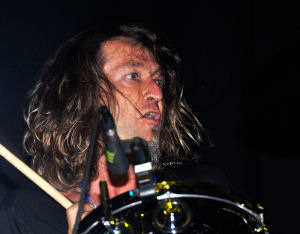
Geoff Dunmore, Photo Dave Hughes
You can read now, I’m presuming?
“Yeah I can read, I wouldn’t say I’m a brilliant reader. But it’s very unusual I ever get a part.
Are you ever deemed to be part of the writing process?
“Nowadays I don’t think you can look at it in the way which says: ‘I should get’ [something for my input]. Sometimes they’ve got a loop going which they’ve written the rest of the song on, but I suppose in essence I’m still writing the drum part really.
I did have an instance a few years back, a particularly well known female artist and I went to cut six songs and I was warming up just playing grooves while they got themselves together. I came back three or four weeks later to do some more songs and was listening to the demos and thinking this sounds like my drums and I said to the guy ‘these drums, what loops are they, where did you find them’ and he said ‘we just cut them up from when you were warming up last time and then we wrote the song around them’ and I thought ‘you bastards’. On one hand, you want to accommodate and be as helpful as you can, but there are occasions where you feel you’ve been screwed. Like all these things, you’ve just got to bite the bullet and get on with it.
Years ago I spoke to Willy Green who played with the Neville Brothers and he also felt he was being screwed over the writing and so he got into a studio and the Brothers said ‘right what are you going to play on this Willie’ and he said ‘I don’t know’ and they said ‘what do you mean you don’t know?’ Willie said ‘if you don’t tell me what you want to play and I come up with something then I’m writing it and I should be part of the writing royalties.’ They said ‘Taxi for Mr Green’ and Willie was gone, although eventually he did come back.
Interestingly, Ian Banks, a Scottish Author, wrote a novel called ‘Espedair Street’ about a Glasgow band and he knew more about bands than perhaps he should have done. I was really surprised reading the book where this particular band had exactly the same problem as the Nevilles. They solved it by giving everybody who contributed to the writing/arranging process a percentage of the publishing royalties. Normally the guy who came in with the chords deems himself to be the guy who actually wrote the song, that’s how it works. I thought Ian Banks’ ‘novel’ solution was the most equitable thing I’ve ever heard. I don’t know if you know how Genesis work, but with Genesis, whoever brought the song in they all share equally in the writing royalties!
“The same as U2, that’s what keeps the band together. Without that you end up bickering, as soon as you start making money, you have ‘why is he getting more than me?’
Your first drum kit, what was it?
“My very first drum kit was a Premier with calf-skin heads, I think it was around a 22″ bass drum, but regular heads wouldn’t fit on it, only calf-skin heads would fit. The 16″ floor was calf-skin and it had a 13” rack tom and it was white.
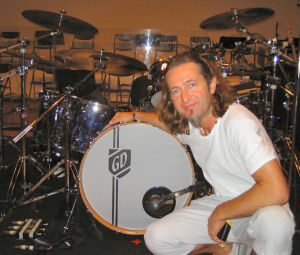
Geoff Dugmore
This was in Glasgow?
“Yes. And then when I was about 15 my father paid £75 (!) for a second-hand Ludwig set exactly like Ringo’s, same colour, everything, which was a lot of money back then. I had that kit until it got stolen out the back of a van in Willesden one night and I was absolutely gutted.
I know you collect stuff now.
“Yeah I really got into it in a big way.
And are you using what you collect?
“Yes I am. I use a beautiful old ‘62 Rogers Bass drum a lot, I’ve got an old Gretsch set, a Hayman, I’ve got 2 DWs, I’ve got about 30 different snares of which my oldest one is a 1921 Leedy with gunmetal carving around it, it’s really beautiful. [For pics of some of these sets check out www.geoffdugmore.com]
Is it an Elite?
“I couldn’t tell you, I got it from a dealer in Cleveland for $1,000 in 1991 and you can only use it with brushes, it’s very soft, the actual metal’s very soft.
I said to the guy ‘these drums, what loops are they, where did you find them” and he said ‘we just cut them up from when you were warming up last time and then we wrote the song around them”
A Ludwig Acrolite is a great weapon in the studio. For years I had one and I would get that one out last, if all else failed. I learned never to get it out first because that would be stupid. No record producer would think after hearing the first snare ‘yeah, that’s great, stay there’. If you take 50 snare drums into a studio the producer wants to hear every single one. I find nowadays I maybe take 10 or 11 snares
That would be for an album, you wouldn’t do that for a single?
“I still take 3 or 4, I take a brass, wood, and aluminium snare. DW do an aluminium.
Nine times out of ten, I’ll end up going there [with my ally drum] because it seems to have a sort of general all-purpose tonality and flexibility, the copper and brass are a little more distinctive. I came across this guy who makes drums call Jug, from maple and birch, he’s actually a furniture manufacturer and he only does a dozen or so a year, they come with inter-changeable hoops. They’re really great sounding drums. I think I paid £200 for it but I don’t know if he still does them.
I would like to drag you in the direction of the Gypsy Kings, how was that?
“It was intriguing, I had been working with this guy called E.T. Thorngreen, an American record producer, on a record for Debbie Harry, he went back to New York, he was a big mixer at the time as well.
So, the Gypsy Kings all trooped in and we chatted about how they wanted to add a bass drum to the song and they wanted to get that Spanish clapping vibe going. So what we ended up doing was getting a couple of the bigger Rototom inners and we put cymbals inside, so they’re playing away and I’m playing the bass drum, and then there was a basic problem in how we were going to end the song, so E T said lets do a fade, and they said ‘how do you do that’ and ET said ‘well I pull down the fader’ and they were like ‘I’m not sure about that’. So we ended up doing a natural fade which was great. The beauty of the Gypsy Kings was that it was all very new, fresh and exciting for them, I don’t think they’d been through the whole recording process at that level. There was no click track, no 1, 2, 3, 4, they just looked at each other and started. It was great.
Did you play live with them?
“No, I just did some stuff in the studio with them. It’s funny, we toured with them, and I used to stand back and they sounded like the loudest skiffle group I’d ever heard. To be honest, I had no idea what the drummer was doing, where he was in the whole thing.
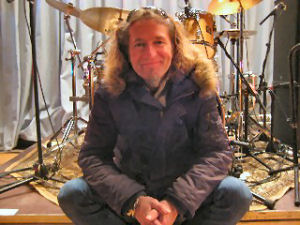
Geoff Dugmore
“I spent a lovely afternoon once in Central Park with a whole bunch of Cuban guys, percussion players, I heard this music and went to play, and I got into that whole [where’s the one?] discussion with them. They said with Cuban music you can have 9, 10 up to 15 different rhythms, its not just a case of one instrument playing something as a rhythm, in their language you’ve got to have upwards of 5 different percussive instruments playing something different to make one rhythm. The great thing about Latin music is there’s no 2 and 4, but it swings like a mother, and do you miss it?
I think we rockers invented 2 and 4, which is quite funny really because jazz all of a sudden appears to have 2 and 4 in it.
“I was listening to some old Frank Sinatra songs the other day and I thought ‘this really swings’ then I suddenly realised there were no drums there, but it still absolutely swings just from the orchestra, lessons to be learned there for everybody.
Absolutely. As you get older you realise what drumming’s all about. It’s very important, but of course you can’t teach somebody. Drums have become an extreme sport. I was talking to Tim, at Drummer Live who was the fastest bass drum player in the world. I know him from the Arbiter days, but have to admit I just don’t get it.
“I don’t know if I would really understand what the point of it was, other than just personal, and all credit to them.
Yes, he’s certainly incredibly unbelievable!
“But where do you use it in the song.
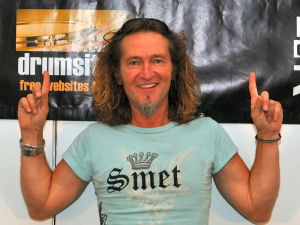
Geoff Dugmore
Nobody’s ever said to us ‘can you put some more in it, play some more’, there’s never an advert which says ‘drum soloist wanted’. You don’t see that.
Photo Dave Hughes
“What I would call professional clinicians. I think what they do is amazing, but I think they sometimes do themselves a injustice in that they get so engrossed with that side of things that they lose touch of music.
It’s another art isn’t it? It’s an overplaying art which doesn’t translate well to the mainstream. Nobody we know, with respect, has ever gone in a studio and been asked to overplay. It is rather strange seeing these highly specialised guys. I spoke to Virgil Donatti and he told me he was struggling to find a gig. I didn’t know what to say to him, I watched his clinic and he played time for the first couple of bars then he was gone. I ate with Thomas Lang and Mike Dolbear and I know he leaves all the fireworks behind when he’s in the studio and plays for the song.
In a previous life I was doing a clinic in Paris with Mel Gaynor and everybody was overplaying like mad because that’s what you do in that situation. Then Steve Ferrone came on sat at the drums and said this is what I do for a living as he launched into: boof, daff, boof-boof, daff – all the French people went crazy. It was such a relief to hear basic feel after the technical virtuosity they’d been bombarded with.
“If I was a kid and I went to see that, yes I’d be impressed, but I think I would come away thinking ‘I’m not going to bother because I’m never going to get to use that, so what’s the point. For me the whole point of going to see somebody, is that they can relate to you, that they think ‘I can do that’ and ‘maybe I can get a gig’. I do very few clinics because to be honest they terrify the wits out of me, because I always think people are going to expect you to do the most incredible solo.
I’d listened in to Geoff’s Master-Class at Drummer Live and brought-up one of the questions he’d asked the audience. He said: “if we’re going to go from the verse to the chorus, what sort of fill are we going to put in?” Nobody had said a word. Experience tells you to only put in a fill that has something to do with the song. If it has nothing to do with the song, it shouldn’t be there. But it takes years to learn that because there’s so much an element of ‘I want to put my little bit in here’ even if it has little to do with the song.
“That touches on listening to phrasing of the vocalist because you can’t go across that otherwise you’ve completely ruined his/her big moment.
Playing with singers is another art all of its own. It’s not about you at all. You’re the structure.

Geoff Dugmore
Did I read somewhere you’d toured with Van Morrison?
“No, I’ve never worked with Van Morrison.
Would you like to?
“No, having heard the tales, I think I would be letting myself in for an absolute hounding. The number of musicians he seems to go through, or drummers he seems to go through. In fact my wife got asked to manage him about 7 or 8 years ago and she is an absolute Van Morrison fan, she adores his music, she was so flattered to be asked but she said there was no way. She’d much rather just enjoy his music.
I’ve got a friend who plays in a band called Van The Band, and it’s not a tribute band, but they get to play all the songs. Every now and then their drummer can’t make it and I’ll dep it, it’s wonderful. It’s a bit like playing with Ray Davis, you listen to the Kinks songs and think you know them until you trip over that 5/4 bar that nobody told you was there, or the 2/4 that Ray put in because he wanted to get another word in, and it appears Van is the same.
So what’s going on now with Geoff Dugmore, what’s the next thing in your life?
“Professionally, I’m off to Madrid to do two albums there, I’m not sure who the artists are to tell you the truth, it’s two different artists, PKO studios, really great place, with real drums. Then I’m back to do Glastonbury with a girl called Laura Maguire, I’ve just finished the Will Young album, the Leon Jackson album, a girl called Laura Critchley’s album, another girl called Natalia, then I’m out to LA to do some stuff with Bob Clearmountain. Again I don’t know who the artist is.
So not much going on then! Where does this take us up to, August?
“Yeah, October I’m out on the road for two or three weeks with a girl called Heather Nova, who’s one of my favourite female artists. I’ve got some more shows coming up with an American girl called Amy Keys who sings with Herbie Hancock, a three piece, she’s got a stunning voice, and then next year I’m out on the road with Johnny Hallyday, a French singer,
A Ludwig Acrolite is a great weapon in the studio. For years I had one and I would get that one out last, if all else failed.
Do you speak French?
“I learnt a bit, I was out with them for a year and a half in 2006
It’s a proper gig then?
“We start of with 10 nights in the Stade De France!
What’s he like?
“He’s absolutely brilliant, a lovely guy, totally into his music, and the personnel who have been with him, he had Hendrix, Jimmy Paige, they’ve all played. Now the band consists of Brian Ray from McCartney, Robin Mesurier from Rod Stewart, Louis Conte percussion, the band is super.
Since my days living and working in France I always wanted to play with Johnny Hallyday. What sort of stuff does he do these days?
“I would say its probably mainstream rock ‘n’ rolls. I would say he’s sort of France’s Rolling Stones, Elvis kind of vibe, every country has one. I’ve done four albums for him now, Abe (Laboriel) Jr was doing the live stuff and then he asked me to do the last tour. I think just because I’d done so many albums of his, he was liking what he was hearing.
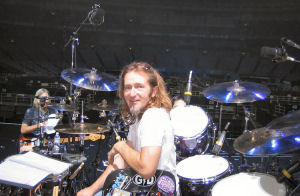
Geoff Dugmore, Photo Dave Hughes
Are there any problems working in France these days?
“No, its EU. The only trouble is you still have the withholding tax, that’s an issue certainly with Japan, we’re supposed to have a joint treaty, I do a lot of work in Japan as well, but every time I’ve been there the Japanese authorities take 20% and then you get taxed again when it comes this way, you don’t get it back.
Do you prefer to play live?
“I like to try and get a balance of the two to be honest with you. Working in the studio has a certain creative nutshell. I do an awful lot of writing and a great deal of library music, like a lot of guys do; and a lot of jingles. I wrote some songs on Johnny’s albums. I’ve written quite a few different things for different people. The most recent stuff is for Johnny Halliday.
I know you started out on guitar and play a lot of instruments. You’ve had a lot of writing success haven’t you?
“I had success with my first band as a writer, we had a big No. 1 on the West Coast of America. I suppose writing and playing always went hand and hand. The writing scenario is like everything else, you’ve just got to keep doing it and knocking on the doors. There’s a lot of networking involved.
It does make a difference by and large.

Geoff Dugmore, Photo Dave Hughes
“Not only that, it does give you a better understanding as a musician. You really start to understand the songs, you’re asked to work on.
When we spoke Geoff intimated he was up to something which, had he told me about he’d have had to kill me. It turns out he was recording with Jimmy Page the ‘Whole Lotta Love’ segment they used on the red bus in Beijing for the hand-over of the Olympic flag to our Boris.
Not too shabby eh!
It turns out he’s now played with John Paul Jones and Jimmy Page so he only needs to do something with Robert Plant and he’s worked with them all.
Who knows, Led Zeppelin may be around the corner. The only question is will Geoff be too busy to do it?
Words, Bob Henrit


